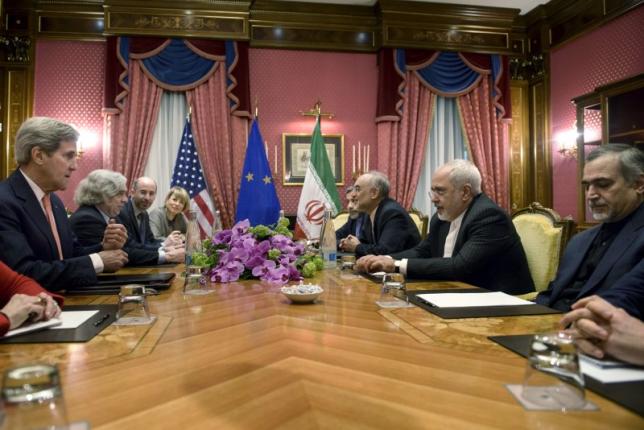
While Iran is cheering for having achieved a historic nuclear deal with the United States and five other major powers, the Republican reaction to the landmark agreement has come as a dampener for the Middle East nation, as the Grand Old Party is expected to disapprove it in the US Congress.
The US Congress is likely to vote on the Iran deal in September, after completing a time period of 60 days to review it.
But even before the process has begun, Republican leaders have strongly denounced the deal, which aims at putting curbs on Tehran's nuclear programme for ten years while lifting the economic sanctions off the nation's back.
The Republican sentiment suggests that the Congress resolution on the deal could be one of disapproval.
While the resolution of disapproval can be vetoed by President Barack Obama, who has thrown his weight behind reaching the Iran deal, two-third members of the Republican-controlled Congress can override his veto.
"Overriding of a presidential veto has not happened in the recent past in the US, and the Republicans do not have a 'veto-proof majority' to do so," Neelam Deo, director at Gateway House, a foreign policy think-tank, and a former diplomat who has also worked as a Consul General in New York, told IBTimes India.
"However, anything can happen," she added.
But the real question is - why are the Republicans so vehemently opposed to the nuclear deal?
Here are some possible reasons -
Genuine concern about Iran'n nuclear programme?
The Republicans have expressed deep concern over the deal, which some of them have called a 'death sentence for the state of Israel'.
Republican leaders lashed out at the deal, citing that it gives Iran the leeway for nuclear proliferation.
"I begin with skepticism because two years ago we had a roguish country with a boot on its neck and we went from dismantling their (nuclear) program to managing their proliferation," Senate Foreign Relations Committee Chairman Bob Corker was quoted as saying by The Wall Street Journal.
"They don't want a power plant, they want a bomb. So every Arab nation is going to have to say the following about 15 years from now, they're going to have a nuclear weapon, so we better get started on ours," South Carolina Senator Lindsey Graham told CNN.
According to Republican presidential candidate Donald Trump, "Iran gets everything and loses nothing".
Are Republicans Worried about Losing US Allies?
Several other Republican presidential candidates have slammed the deal citing that it is likely to jeopardise relations with America's allies.
Nations such as Israel and Saudi Arabia, both of which are America's allies, have slammed the deal.
"The Bush family is known to have close relations with Saudi Arabia's royal family, and the Republicans will not want to jeopardise USA's relations, with them," Deo said.
The bigger concern is, of course, over Israel, which considers Iran its arch-enemy.
Israeli Prime Minister Benjamin Netanyahu, who called the Iran deal, a 'historic mistake', is likely to lobby the US Congress, especially Republicans, to quash the deal, as Obama has himself anticipated.
"(He) perhaps thinks he can further influence the congressional debate, and I'm confident we're going to be able to uphold this deal and implement it without Congress preventing that," Obama told The New York Times columnist Thomas Friedman.
Netanyahu perhaps made his agenda clearer on Wednesday when he said that the Iran nuclear agreement is 'not the last word', according to The Jerusalem Post.
Jewish votes ahead of 2016 elections
Genuine concerns aside, the Republicans' roadblock to the Iran deal could be based largely on politics, given that the 2016 presidential elections are around the corner.
The Republican's could be using the deal to try and wrench away Jewish voters from the Democrats, as they eye the 2016 elections.
The Jewish-Americans have traditionally been Democrat supporters, and Deo pointed out that when Obama was reelected in 2012, more than 70% of the Jewish-American population had voted for him.
"The Jewish-Americans voted for Obama despite Israeli Prime Minister Benjamin Netanyahu himself publicly supporting Mitt Romney," said Deo.
Election Campaign Money
An interesting explanation as to why the Republicans could be so motivated to rip apart the Iran deal was highlighted in a Reuters article, which said, citing the Center for Responsive Politics, that pro-Israel groups contributed $11.9 million to candidates for the US Congress in 2014, giving $6.8 million to the Democrats and $5.1 million to the Republicans.
The Republicans may be looking for a larger share of the political campaign donations pie ahead of the 2016 polls.
According to the report, one of the top Jewish contributors the Republicans will be eyeing is Sheldon Adelson, a billionaire who had reportedly contributed $92.8 million to the GOP in 2012.
In fact, several pro-Israel organisations in the US have already condemned the deal.
The American Israel Public Affairs Committee (AIPAC), said to be the most influential pro-Israel lobby in the US, said it was 'deeply concerned' about the Iran nuclear deal.
AIPAC reportedly spends $3 million on lobbying annually, according to the report.
Targeting Obama
All the top Republicans have come out to critique Obama scathingly for pushing for the deal, with some even stating that the 'next Republican president' will overturn the deal.
One of the key reasons for the Republican opposition is that the Iran deal is likely to go down in history as a legacy of the Obama administration.
"Obama's supporters have been projecting the nuclear deal as a big victory for the government in stopping Iran's nuclear programme," Deo said.
Moreover, Americans have, by and large, supported the deal, Deo said.
The Republicans, therefore, many not be entirely comfortable with letting Obama get ahead with the elections so close.










